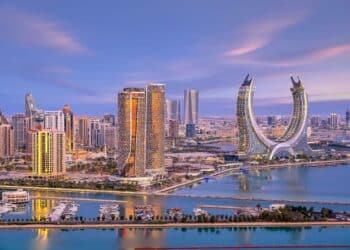
Alpen Capital’s latest report on the GCC Hospitality industry projects a robust compound annual Growth Rate (CAGR) of 7.5% from 2023 to 2028, highlighting the sector’s dynamic growth potential. This comprehensive analysis delves into recent trends, growth drivers, and challenges while profiling key players in the region’s hospitality landscape.
Post-COVID-19, the GCC hospitality sector is not just recovering; it’s thriving, fuelled by economic resurgence and booming tourism. Governments across the region are reducing their reliance on hydrocarbon revenues, focusing on developing a sustainable and diverse economic landscape. This pivot is supported by significant investments in infrastructure, such as airport expansions and the construction of luxury hotels and resorts, aimed at bolstering the tourism sector. These efforts are complemented by promoting MICE (Meetings, Incentives, Conferences, and Exhibitions) and corporate tourism, set to draw record tourist numbers.
Digital transformation is at the heart of this growth, enabling operators to offer tailored services that enhance the guest experience and foster brand loyalty. This technological leap is not only elevating operational efficiency but is also setting new benchmarks in customer satisfaction.
There’s a noticeable shift towards sustainable and responsible tourism, driven by global ecological awareness. The GCC hospitality sector is adapting to these changes by integrating green practices and promoting eco-friendly tourism. This shift is not only a response to consumer demand but also a strategic alignment with global sustainability goals.
Moreover, the rise of cultural and, health and wellness tourism reflects changing consumer preferences and lifestyles. These new tourism segments are gaining popularity, indicating a broadening scope for the GCC’s hospitality offerings. Despite market competition and geopolitical uncertainties, the sector remains resilient, continually enhancing visitor experiences through innovation.
“We expect to witness healthy domestic and cross-border M&A activity as the sector advances to GCCs and responds to the rising demand for accommodation and hospitality services,” says Sanjay Bhatia, Managing Director, Alpen Capital (ME) Ltd.
According to Alpen Capital, the GCC hospitality sector’s revenue is set to soar, reaching approximately US$ 48.1 billion by 2028. This growth is uniformly supported by all GCC countries, with Saudi Arabia and the UAE making significant strides thanks to numerous government-led initiatives and modernised infrastructure. Qatar, Kuwait, Oman, and Bahrain are also expected to see high growth rates, propelled by specific regional developments and investments.
The sector’s key performance indicators—Occupancy Rate, Average Daily Rate (ADR), and Revenue Per Available Room (RevPAR)—are expected to improve significantly. Increased tourist arrivals and a host of mega MICE and sporting events in the region will drive this enhancement. Such activities promise substantial economic benefits and reinforce the GCC’s position as a global tourism hub.
The GCC hospitality sector faces global economic uncertainties and a skilled workforce shortage. However, it continues to innovate and adapt, leveraging digital tools and sustainable practices to meet the evolving demands of global travellers. The ongoing investment in transport infrastructure, including new airports and rail networks, will further boost the sector, enhancing connectivity and accessibility.
Alpen Capital’s report paints a promising picture of the GCC hospitality sector’s future. With a strategic focus on innovation, sustainability, and cultural enrichment, the industry is well-positioned to capitalise on the growing global travel and tourism market, ensuring its resilience and continued success in the face of emerging challenges and opportunities.


































































